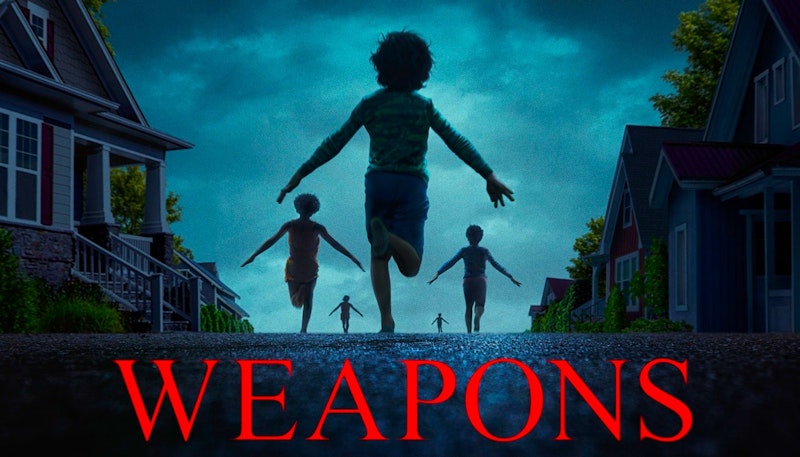One could pinpoint a detrimental trend in contemporary filmmaking by watching Weapons: a trite logic of resolution that seeks to explain rather than invite the audience to live with the film. The director, Zach Cregger, has described his sophomore solo effort as a film exploring the grief he feels from the sudden loss of his Whitest Kids U’ Know co-star Trevore Moore—although compared to other conspiratorial grief films released this one (The Shrouds, Invention), Weapons seems averse to its own mystery. Or averse to its mysteriousness, because rather than having the absence of death (or specifically in the case of Weapons, disappearance) lead the characters and their story on a wild goose chase towards something that’s truly gone, Cregger instead runs looking for a way to weave everything together rather than letting it unravel. It’s a natural, if lazy, inclination, and it isn’t very artistically or thematically interesting. While the ending of Weapons could be described as a kind of Sirkian catharsis—where an ostensibly “happy” conclusion barely conceals the harsh, irreparable reality of the film’s story (think Blue Velvet)—that doesn’t make up for the fact that Cregger’s primary formal function is not thematic exploration but narrative slight-of-hand and “oh!” moments.
There are two provocative images in Weapons. The first is the well-advertised concept of 17 school kids all getting out of their houses simultaneously in the middle of the night and running off into the dark, never to come back. It has an obvious real-world parallel in the school shootings which were particularly endemic in the 2010s, whose inexplicable violence has been the subject of innumerable political debates and news stories. That haunting, confounding epidemic was explored cleverly at its roots by Gus Van Sant in his Columbine-inspired Elephant, which melded the harshly banal build-ups to violence in Alan Clark’s short of the same name with the plodding non-linearity of Béla Tarr’s Sátántangó. Cregger isn’t thinking as high concept here, instead reaching for Paul Thomas Anderson’s Magnolia as inspiration for his ensemble project. While that might influence the interconnectivity of the characters, it does little service to the application of Cregger’s images. While Magnolia is wrapped up by an extraordinary act of nature, Weapons starts with its most emotionally charged, beautifully unbelievable happenings and chooses to solve its own puzzle not to make a point but simply to keep audiences along for the ride.
The other breathtaking image in Weapons is also borrowed from another film, not just spiritually in its purpose to the plot, but in how it looks. The one child who didn’t disappear along with his classmates is followed home by his teacher, who watches him get swallowed into the black void behind the door of an otherwise typical suburban house. This image, especially the distance it’s shot from and the concerned parental stand-in who’s observing it, is nearly identical to the final sequence of shots from Atom Egoyan’s Exotica. In what’s practically a post-script to the narrative tying its last knots, Egoyan’s film spends its final few minutes in a time we’ve only ambiguously glimpsed through home video up to that point in the story. We see two of the film’s core players as we haven’t before: Francis, here in the past where he was happily married and a proud father, and Christina as a pimply and awkward teenager. Bruce Greenwood and Mia Kirshner are playing entirely different characters to the ones we’ve spent the entire movie with. We’re primed for this, given that Kirshner in particular will code switch throughout the film depending on the role she needs to take at any given moment (Exotica is, at least in part, a film about roles). What we’re not primed for is Egoyan’s final rug pull.
“If ever there’s anything you want to talk about—about what might be going on at home, or whatever, you know that I’m here, okay?” Francis tells Christina before insisting on paying her for babysitting. “You know I really enjoy these drives home, Mr. Brown.” “Good, good. So do I.” Christina gets out of the car, the window reflections creating an inseparable barrier between the two—Francis (and by extension the audience) can’t really know her. We watch as she steps between two massive hedges and down a long, straight path to her two-story brick house, all of its windows with the curtains drawn except for a sliver open in the top left, suggesting some sort of watching is taking place on the other end. Christina disappears behind the door, and a cat looks back at us before a hard cut to black.
It’s a horrifying image through its banality, like the Palmer house in Twin Peaks. And Egoyan’s literal and metaphorical door shutting at the end of Exotica is terrifying by the way it also opens so many other doors for Christina’s background, forcing us to speculate what kind of terrible things could be going on behind those walls without ever getting an answer. When Cregger replicates this image in Weapons, he spends the rest of the film showing us exactly what’s in the house and why it’s that way. Egoyan notoriously doesn’t always hit the mark he’s going for, and he’s obsessed with his own puzzle boxes for his own good, but he’s smart enough to know why that structure works and how it can imply so much more beyond its own confines. Cregger doesn’t seem interested in what can happen beyond the frame or the broader implications of his story, or if he is he doesn’t show it by way of his filmmaking. Instead of getting into something that’ll give us a few quick scares, Cregger would rather dive into his pictorial horror to show why it’s not really that scary at all: it has answers and a logic, it’s something not to be reckoned with but solved, and he’ll hold your hand to make sure you can do it, lest you go looking for something just out of frame he wouldn’t want to deal with himself.

